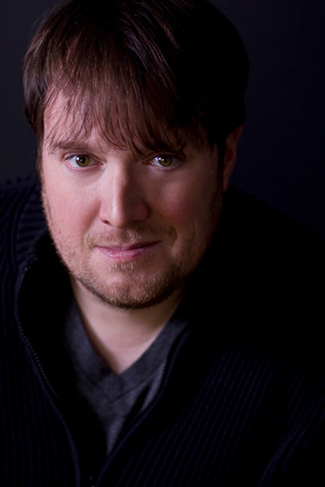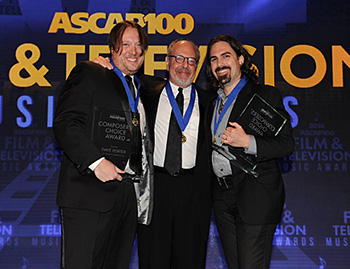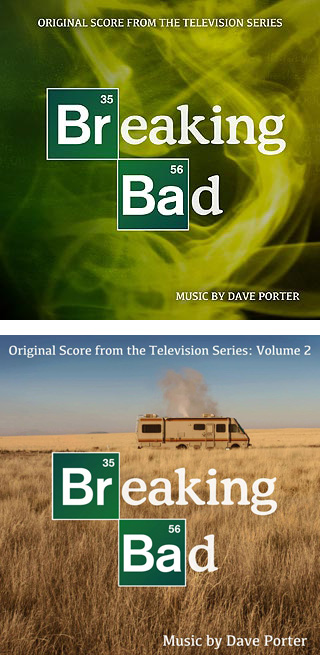

  |
|
|
||||||||||||||||||||||
|
FMS FEATURE... July 3, 2014 Composer Dave Porter Talks Breaking Bad New projects include ballet series Flesh and Bone by Jon Burlingame  Dave Porter, who composed the theme and scores for all 62 episodes of the critically acclaimed AMC series, has one more chance: Its sixth and final season ended in September 2013, making it Emmy-eligible for the current television season. Nominations will be announced July 10. Just last week, Porter won ASCAP's Composers' Choice Award as "favorite TV composer," chosen by his fellow ASCAP composers and songwriters (in a tie with Bear McCreary). His other scores include ABC's Red Widow and TNT's Saved. "My view on music for film is very much about supporting the story," he says. "And because of the way Breaking Bad is constructed, that meant 'small,' and sometimes very brief. Not a lot of score, but hopefully important score usage."  Composers Dave Porter, Mark Snow and Bear McCreary The lack of Emmy attention may also have to do with the nature of Porter's music, which was often textural, rarely utilizing recurring themes or recognizable musical instruments. "When I saw the pilot," Porter says, "it felt very filmic, large in scope. I wanted to do it in a non-traditional, non-orchestral way, because the show itself was so unexpected, so jarring, and there was clearly, from the very beginning, so much about Walter White [Bryan Cranston's character] that wasn't what it seemed." Porter's process was unusual, too. "It's a complicated mix of things," he says. He has a collection of vintage synthesizers and numerous world-music instruments; he would also invite percussionists and other musicians into his studio to record various musical ideas. "Whether those performances made it into the composition unchanged or unprocessed or unaltered, was always unlikely," he explains. "For me, at least in the world of Breaking Bad, there weren't any rules. I was very happy to apply whatever processing, or make digital or analog enhancements, I could." Porter did use Aztec-inspired percussion sounds whenever the show crossed the border into Mexico; and used a five-note riff that he himself played on a Japanese koto "every time Walter put on his black hat and became Heisenberg." There was a single nod to the Southwestern locale, and that was in Porter's main-title theme: the brief use of a dobro, a resonator guitar. "I didn't want to pigeonhole it in New Mexico, because the show was much more universal than that," he says. "Walter is everyman – at least everyman at his breaking point." Porter's musical palette remained largely the same over the six seasons, although it necessarily became "darker and more overtly aggressive," reflecting the drama itself.  This past season, Porter added another critically acclaimed series to his resume: NBC's crime drama The Blacklist with James Spader. The composer describes it as "a kind of hybrid orchestral-electronic mix" but created entirely in his studio using samples and sounds from his library. "It's definitely frenetic and fast-paced," he adds, noting that post-production often ran so late during the first season that "they were often still shooting on Friday for a show that aired on Monday," making the composer's job even more last-minute than usual in TV. Also upcoming for Porter is Flesh and Bone, the new Starz series from Breaking Bad writer and co-executive producer Moira Walley-Beckett, described by Starz as a "dark and gritty series that will explore the dysfunction and glamour of the ballet world." Walley-Becket is a former dancer, Porter notes, "so she knows this world intimately and is very passionate and extraordinarily knowledgeable about it. It's going to be unflinchingly raw and powerful." Porter recently returned from visiting shooting locations in New York and, while he has yet to begin writing, "it's going to be a complete departure from what I've been doing for the past six years – entirely orchestral," although he expects that will translate into "small ensemble" in practical fact. But the nature of the drama, he thinks, will mean real musicians, not synthesizers or samplers. The order for Flesh and Bone is for just eight episodes, so Porter is hoping to finish his work on that series before diving back into The Blacklist for a second season. He's also hoping to get the call for the Breaking Bad prequel series Better Call Saul with Bob Odenkirk, expected to air on AMC in early 2015. ©2014 Jon Burlingame |
Search
Past Features
|